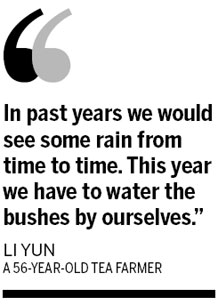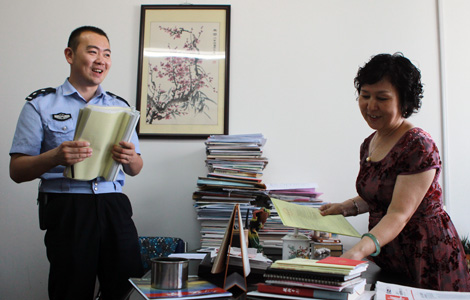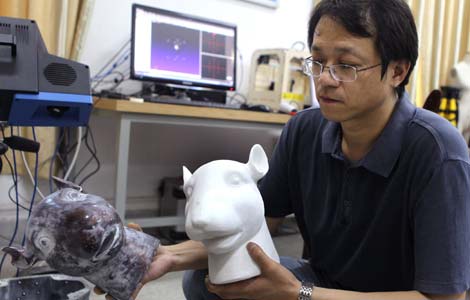Heat wave wilts green tea crops
Updated: 2013-08-14 07:38
By Wu Yiyao in Shanghai (China Daily)
|
||||||||
Mei Jiguang, a tea farmer in Hangzhou, the capital of East China's Zhejiang province, worked continuously on his tea plantation for 24 hours on Aug 13. Like many of his neighbors, who are also tea farmers in the region, irrigating the tea bushes seemed to be the most effective way to save their plants from withering in the heat wave.
In Meijiawu, where some of China's finest teas are produced, farmers usually pick tea leaves only before the Qingming Festival. The amount of tea leaves picked during autumn is limited. Toasted tea leaves are not regarded as huge losses for tea farmers. What worries them is the bushes withering in the heat.
"It has been scorching for weeks. Despite the shower a few days ago, the tea bushes are drying up, tea leaves are getting toasted and my only hope is that my bushes can survive the heat and drought," said Mei.
Mei spent about 5,000 yuan ($ 810.87) on purchasing irrigation facilities and hiring people to water the crop that used to be green but is now an arid brown. Other measures employed to protect the tea plants from the hot sun include covering them with black nets, a method that may reflect some light and heat, and protecting the roots with soft weeds.
Heat during summer is nothing new in Hangzhou, but the lingering heat and drought this year is especially difficult for tea farmers.
"In past years we would see some rain from time to time. This year we have to water the bushes by ourselves," said Li Yun, a 56-year-old tea farmer.

If one tea bush dies, the loss in the upcoming 2014 spring could amount to thousands of yuan, said Li, who estimates there are some 4,000 bushes in her plantation, many of which are more than 20 years old.
"It takes years to cultivate a high-quality and productive tea bush. Bushes for us are like cattle for herders and machines for factories. Each bush is a source of income. We just can't bear watching our bushes dying," said Li.
On average, it takes some four years from planting a tea bush to harvesting quality leaves. If a tea plant dies, the effect on incomes may last longer than a year.
Zhu Xiang, village head of Meijiawu, said about 20 percent of tea plantations in the region are "about to die".
Shang Jiannong, general secretary of Hangzhou Xihu District Longjing Tea Industry Association, said authorities are calling up tea experts to guide tea farmers to irrigate their plantations.
"Irrigation should not be undertaken at midday because the water evaporates quickly at that time and overheats the roots, which makes things even worse," said Shang.
In Taizhou, Anji, Fenghua, and Yuyao in Zhejiang provinces, tea farmers are facing the same problem - withering tea bushes and very likely reduced output during the upcoming 2014 spring tea harvest. Temperatures have been higher than 40 C for more than a week in these areas.
It is essential to take measures after the heat to help tea bushes to recover from the scorching days, including trimming burned leaves and branches, said Luo Liewan, from the tea sector of the Zhejiang provincial department of agriculture.
"It is not advisable to weed out the bushes or loosen the soil when it's hot because this may hurt what is an already fragile piece of vegetation. The key is to keep the bushes away from heat and too strong light, keep the soil moisturized and the plants watered properly," said Luo.
While tea farmers worry that the reduced output of tea leaves may lead to volatile tea prices next spring, market insiders say it does not necessarily mean tea prices will surge in 2014.
In 2013, farmers of the finest tea products felt the pinch of an official squeeze on spending in a campaign against extravagance. Some tea prices plunged from 8,000 yuan a kilogram to 4,000 yuan a kg.
"If demand for green tea remains the same in 2014 and most of the bushes can survive the hot days, green tea prices will not fluctuate significantly. The possible loss in regions hit by heat and drought may not form a large portion in the nation-wide green tea market and affect supply significantly," said Tao Enqian, a tea trader in Shanghai.
wuyiyao@chinadaily.com.cn
(China Daily 08/14/2013 page16)

 Huawei unveil Ascend P6 smartphone in Vienna
Huawei unveil Ascend P6 smartphone in Vienna
 That's one cool game of mahjong
That's one cool game of mahjong
 Isinbaeva leads harvest day for host Russia
Isinbaeva leads harvest day for host Russia
 Perseid meteor shower puts on show in night sky
Perseid meteor shower puts on show in night sky
 Bird flu, slowdown hit sales at fast-food chains
Bird flu, slowdown hit sales at fast-food chains
 PetroChina poised to dominate Iraqi oil
PetroChina poised to dominate Iraqi oil
 Marriage attitudes slowly change
Marriage attitudes slowly change
 On frontline of fight against crime
On frontline of fight against crime
Most Viewed
Editor's Picks

|

|

|

|

|

|
Today's Top News
Brazil demands clarifications on NSA surveillance
2nd-generation ID cards to include fingerprints
Chinese students boost boarding business in US
TCM chain probed after illegal house exposed
Friends of accused Boston bomber due in court
Economic hub on Bohai Bay
PM to visit China for milk scare
Donors of organs easing transplant shortages
US Weekly

|

|




